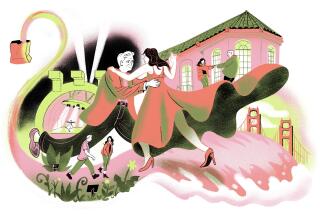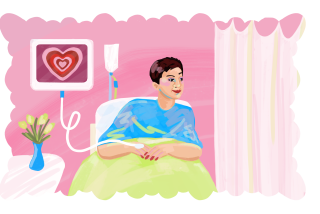The World Is Full of the Walking Wounded Looking for Love
The other day at lunch in my favorite restaurant, I couldn’t help overhearing two women agree that, since all the good men had already been accounted for, the best strategy for career women was to look for someone who had been widowed in the prime of life--market-tested, as it were.
Since I fit this category, I savored the comment but didn’t feel quite bold enough to go over and announce with a flourish, “Here I am!”
Moreover, as the survivor of a happy marriage prematurely terminated by cancer, I knew that what counts is not what you get but what you give. Not what you play safe but what you risk. Not what you find but what you lose.
Shopping around has about as much to do with love as bargain-hunting does with meaningful relationships.
Why? Well, for one thing, window-shopping tends to focus on the individual’s good points, and we can all get along with each other’s good points. There isn’t a soul on Earth who doesn’t welcome physical, financial, social and mental good points.
But it is our imperfections that make us who we really are--flaws not readily apparent--and relationships begin when these seem funny instead of annoying.
For instance, suppose someone persistently uses “like” for “as is,” or handles the fork like a dagger when eating, or leaves things lying around for somebody else to pick up. If we find this amusing, we get along.
But if poor grammar, coarse table manners and domestic sloppiness irritate the hell out of us, all the wonderful merit badges so attractive to window-shoppers won’t keep disgust from growing.
Another thought I could have mentioned was that the world is full of the walking wounded: Men and women in need of love but not knowing quite where or how to find it, because to find it, you first have to be vulnerable to it . . . as well as aware that nothing is forever, that life is change, that the ultimate cost of love is loss.
In fact, the greater the love, the greater the eventual loss; the greater the loss, the greater the grief--grief so painful that it can be impossible to survive.
And it is the so-called good guys who are at risk. As researchers have discovered, the mortality rate for widowers is 61% higher than for non-widowers, with the four main causes of death being heart attack, suicide, alcoholism and car accidents.
Why are we so vulnerable? Because, first of all, society expects us to be as impervious as Gary Cooper in “High Noon,” despite having heart and soul torn away. I know that I pushed myself, no longer wanting to live, and at the same time many of my relatives and friends--especially men--were afraid to share my feelings, which left me emotionally isolated.
Children expect Dad to pull himself together, sort of like performing your own open-heart surgery. Relatives may send you self-help clippings that often equate grief with feeling sorry for yourself.
And the male buddy system generally holds that the cure for any downer is to go out, party it up and have sex--despite the fact that grief is an exhausting emotion that leaves little energy for lust, let alone orgies.
Perhaps the main challenge is that a widower’s survival depends on establishing another caring relationship (within the first two years, researchers advise).
Here he finds himself singled in a world where attitudes as well as hazards have changed, where the children rarely understand his inner devastation and survival needs.
I know mine didn’t. I also know that they love me--were perhaps afraid of what might happen if I were to fall in love again.
As F. Scott Fitzgerald put it in “The Crack-Up,” commenting on his grief over Zelda: “A man does not recover from such jolts; he becomes a different person, and eventually the new person finds new things to care about.”
I’m not so sure that one emerges “new” so much as simply bewildered, groping with--rather than striding confidently into--a great many imponderables.
That is, the male survivor of a healthy marriage is confronted by a host of unexpected circumstances (quite apart from surgically enhanced bodies) that require poise and a sense of humor . . . often when he is not feeling at all in command of either.
These can range from simple matters, such as finding that you’ve locked yourself out of the house or lost your glasses, to the vastly more complex--getting ripped off by an investment counselor or being had by “friendly” competition at work.
But eventually it comes down to the challenge of dating again and discovering that if you are a good-looking, courteous male, you are easily distinguishable from the yahoos and so are in active demand.
Few of the demands, however, are from those seeking to give, and most are based on externals. For instance, one woman I met was a lesbian but said she needed to date men occasionally. Another had been molested as a child and sought to hurt as many men as possible.
Some women seemed to be married to jobs or to various causes; one was married to God and a few turned out to be literally married.
Also, it seemed that all the widows had been married to saints, all the divorcees to creeps, and I felt frightened by my exposure to the gravity of love lost, how widespread was the inability to forgive and thus change.
The many singles bars, dating services, ads and so forth bear sad witness to the enormous difficulty people have in finding someone who wants to love and be loved.
If I had the chance today, I think I would try to assure those two career women that quality of encounter is more important than quantity of performance, that tenderness and affection are the real way to a man’s heart, that relationships endure when each partner looks not to the ends but the means, looks to doing unto the other as that person would like to be done unto.
And it all begins with mutual respect.


